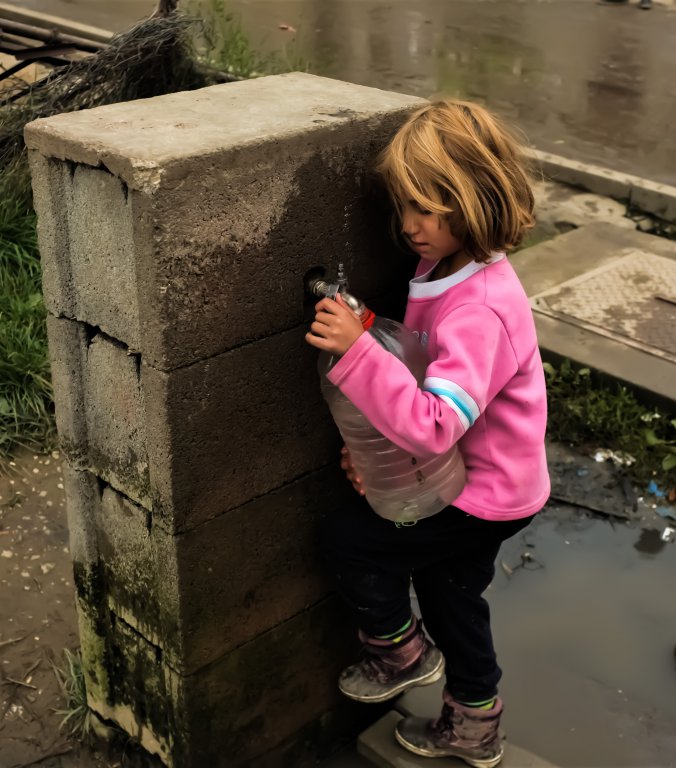Thirsting for justice: Roma and the human rights to water and sanitation
22 March 2017
By Léo Heller
In his foreword to ERRC’s new report ‘Thirsting for Justice’, Léo Heller, Special Rapporteur on the human rights to safe drinking water and sanitation describes how some European states are failing in their obligations when it comes to Roma when it comes to these fundamental human rights.
 The world we want, need, and are entitled to is one in which access to safe drinking water, sanitation and hygiene (WASH) services is adequately available for all, without discrimination based on any grounds. This is central not only to living a healthy life, but to guaranteeing dignity and human rights. Yet billions of people still do not enjoy these fundamental rights.
The world we want, need, and are entitled to is one in which access to safe drinking water, sanitation and hygiene (WASH) services is adequately available for all, without discrimination based on any grounds. This is central not only to living a healthy life, but to guaranteeing dignity and human rights. Yet billions of people still do not enjoy these fundamental rights.
The human rights to water and sanitation require that these services be available, accessible, safe, acceptable, and affordable for all. Moreover, they require sanitary services that provide individuals with sufficient privacy and dignity. These rights also entail an explicit focus on the most disadvantaged and marginalized, as well as an emphasis on participation, empowerment, accountability and transparency.
Whereas the Millennium Development Goals (MDGs) did not possess a clear human rights approach, the 2030 Development Agenda and its 17 Sustainable Development Goals (SDGs) are now unequivocally anchored in respect for human rights. A dedicated goal – SDG 6 – calls for universal and equitable access to safe and affordable drinking water, sanitation and hygiene facilities for all by 2030. This Goal has tight synergy with other SDGs, such as those aiming to reduce inequalities (SDG10) and attain gender equality (SDG5), meaning that either the successes or shortcomings in accomplishing Goal 6 will necessarily influence the capacity to achieve other goals.
Indeed, in some world regions, disproportionate levels of access are observed between disadvantaged groups (e.g. women, persons with disabilities, persons with HIV, ethnic groups, persons living in informal settlements) vs. the “general” population. I have personally testified to the realities lived by some Roma communities. During an official mission to Portugal in late 2016 in my capacity as Special Rapporteur, I found their living conditions, including their access to water and sanitation, disconcerting and certainly comparable to the worst of situations I have seen thus far in previous missions to much less developed countries in Central Asia, Southern Africa and Central America.
This unique report by the European Roma Rights Centre provides compelling evidence that, throughout several States and regions where safe water supply and sanitation services are available to almost every household, Roma populations are systemically disadvantaged in their access to these services. Evidences gathered from Albania to France reveal shocking disparities of the conditions endured by Roma as compared to the rest of the population. In this respect, the report’s conclusions highlight a concerning situation of widespread, deeply rooted social exclusion and ethnic discrimination as regards Roma’s access to these essential services.
The human rights to water and sanitation, recognized by the United Nations General Assembly and the Human Rights Council, require that States explicitly focus on the most disadvantaged and marginalized. The evidence that large segments of this ethnic minority continue to be grossly unserved or underserved in their access to safe drinking water and sanitation suggests that some European States have been failing to meet their well-established human rights obligations.
The report’s methodology is structured with careful consideration for the multiple components of the human rights to safe drinking water and sanitation. The research examined the WASH services used by Roma peoples in terms of their physical accessibility, affordability, quality, safety, and privacy. It further identified the extra burden felt by women and girls among this already disadvantaged ethnic group, who are disproportionately responsible for their families’ WASH-related needs. Indeed, the results give substance to the argument that I advanced in my recent report (A/HRC/33/39) on gender equality in the realisation of the human rights to water and sanitation. Tackling inequalities in access to improved WASH services can be an entry point to addressing other fundamental inequalities, such as those with grounds in gender and ethnicity.
The report’s conclusions and recommendations are clear and in keeping with the requirements of international human rights law. In the current challenging context of mass migration to much of Europe, the human rights of many individuals and minority groups may also be acutely placed at risk. While many states shall turn their attention to guaranteeing the rights of new migrants, it is quintessential that they restore a sense of dignity to the long-marginalized Romani communities, who usually live in highly vulnerable situations.
By providing compelling substantiation that potentially millions of Romani individuals and families have been deprived of the basic human rights to clean water and sanitation for decades, this report calls to be widely read and duly considered in discussions related to the accomplishment of the 2030 Development Agenda in Europe – mainly the goals and targets focusing on ending inequalities. No excuse stands up to the countless commitments that States have made, starting with the more than 70-year old Universal Declaration of Human Rights and the two International Covenants, to realise the right to life, right of everyone to an adequate standard of living, ensure freedom from inhuman or degrading treatment, and to guarantee equality and non-discrimination. The human rights to water and sanitation are intrinsically tied to these cornerstones of international human rights law, and must be treated earnestly as such by all States.




